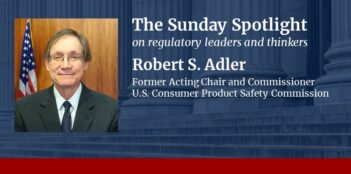
The Fifth Circuit rules that the Biden Administration likely violated the First Amendment, the governor of New Mexico temporarily bans firearms on public property, and more…
IN THE NEWS
- The U.S. Court of Appeals for the Fifth Circuit ruled that certain efforts undertaken by the Biden Administration against social media companies likely violated the First Amendment, such as threatening anti-trust action if the companies did not moderate content related to election fraud and COVID-19. The court, however, limited the ruling to activity designed to “coerce or significantly encourage” certain moderation by social media companies. Louisiana Attorney General Jeff Landry argued that the ruling was a “major win against censorship.” The Biden Administration is reviewing the court’s decision.
- New Mexico Governor Michelle Lujan Grisham signed an emergency order banning citizens who are not law enforcement or security officers from carrying firearms on public property in Bernalillo County for the next 30 days. The emergency order follows Grisham’s executive order declaring that gun violence was a public health emergency. Grisham’s orders responded to recent deaths by gun violence in New Mexico, including the deaths of three minors since July. Bernalillo County Sheriff John Allen expressed concern that the order would keep citizens from exercising “their constitutional right to self-defense,” while Grisham argued that the measure is necessary because New Mexicans are “threatened by the prospect of violence at every turn.”
- A federal judge declared that the enactment of the Deferred Action for Childhood Arrivals program exceeded the authority of the executive branch. The ruling comes after the Biden Administration issued a 2022 final rule designed to bolster the legal status of the Deferred Action program. The judge argued that the revised program was the same as the program previously struck down by the U.S. Court of Appeals for the Fifth Circuit, but clarified that the program could continue administering benefits for current recipients. The Biden Administration disagreed with the decision and vowed to “continue to defend this critical policy from legal challenges.”
- In a unanimous decision, the U.S. Court of Appeals for the D.C. Circuit vacated a 2022 U.S. Consumer Product Safety Commission (CPSC) rule governing cords on custom window coverings, which the CPSC found posed a strangulation risk to children. The court determined that the CPSC violated the Administrative Procedure Act by acting arbitrarily and breaching notice-and-comment requirements when the Commission failed to disclose individual incident reports used to perform a cost-benefit analysis. The court also concluded that the CPSC’s choice have the rule take effect 180 days after it was published lacked “reasoned decision making.”
- The California legislature voted to mandate that most California elections use state-approved ballot counting machines. The bill targets the conservative Shashta County, where local officials voted to end their contract with Dominion Voting Systems based on unsubstantiated theories connecting Dominion machines to election fraud. If signed into law, the bill would ban hand-counting for elections with more than 1,000 registered voters and would limit a county’s ability to terminate voting system contracts. Assemblymember Gail Pellerin, who authored the bill, contended that “hand counts are complex, imprecise, expensive and resource intensive.”
- The California State Senate passed a bill that would require corporations operating within the state that make more than $1 billion annually to disclose their carbon emissions. The bill would require companies to disclose emissions that result from corporate operations, the company’s supply chain, and consumers. State Senator Scott Wiener applauded the passage of the bill, arguing it would allow California to “once again lead the nation with this ambitious step to tackle the climate crisis.” Opponents of the bill argued that the bill would “push publicly traded companies into the role of enforcing emissions targets beyond their control.”
- The Executive Office for Immigration Review (EOIR) issued a proposed rule granting greater discretion to immigration judges and the Board of Immigration Appeals over the management of their dockets. The proposed rule formalizes procedures such as issuing extensions or pauses to parties. The agency issued the proposed rule after the U.S. District Court for the Northern District of California granted a nationwide injunction barring EOIR from implementing an earlier rule limiting the discretion of immigration judges and the Board of Immigration Appeals in managing their caseloads. EOIR suggested that the new rule will “promote the efficient and expeditious adjudication of cases.”
- The Office of Information and Regulatory Affairs received a proposed rule from the U.S. Department of Labor designed to minimize financial advisers’ conflicts of interest and to redefine financial investment advice under the Employee Retirement Income Security Act of 1974. The rule is aimed at limiting the ways that investment advisors are compensated to reduce opportunities for conflicts of interests. The Labor Department also wrote in its agenda that the rule will evaluate existing exemptions to better protect employee benefit plans and IRA investors.
WHAT WE’RE READING THIS WEEK
- In a new paper, Aaron L. Nielson, Professor of Law at Brigham Young University Law School, Christopher J. Walker, Professor of Law at University of Michigan Law School, and Melissa F. Wasserman, Professor of Law at The University of Texas at Austin School of Law, outlined how the independence of agency adjudication is threatened by political control. Nielsen and his coauthors argued that many prominent reforms face significant barriers to implementation. Instead, Nielsen and his coauthors suggested that Congress should exercise its “Anti-Removal” powers to raise the political costs of presidential interference, and that the Executive Branch should adopt self-imposed restrictions on the appointment and removal of agency heads..
- In a policy analysis issued by the Cato Institute, Jeffrey A. Singer, a senior fellow at Cato and Sofia Hamilton, a health policy research associate at Cato, assessed policies targeting the treatment of opioid use disorder (OUD) with methadone, a synthetic opioid. Singer and Hamilton suggested that regulations allowing only government-approved opioid treatment programs to distribute methadone to individuals with OUD create barriers to patient recovery and stigmatize the disorder. Singer and Hamilton proposed that primary care physicians be allowed to prescribe methadone and use their expertise to develop treatment plans responsive to each patient’s situation.
- In a recent Brookings Institution article, Blair Levin, a nonresident senior fellow at Brookings Metro, and Tom Wheeler, a visiting fellow at the Center for Technology Innovation at Brookings, cautioned that any effort by Congress to authorize the Biden Administration to regulate artificial intelligence may be struck down by the Supreme Court under the Major Questions Doctrine, which requires an administrative agency seeking to act on an issue of high “economic and political significance” to have “clear congressional authorization.” Levin and Wheeler argued that current proposals to regulate artificial intelligence may not be specific enough under the Doctrine, but they noted this could be avoided if the Administration and Congress elected to only do business with artificial intelligence firms that adopt a set of voluntary standards.
EDITOR’S CHOICE
- In an essay in The Regulatory Review, Jennifer Doleac, now the Executive Vice President of Criminal Justice at Arnold Ventures, argued that gun control regulation is not the only measure that can curb gun violence deaths. Doleac contended that the effects of gun control regulation on gun ownership and public safety are unclear. Doleac suggested policymakers consider other efforts, such as creating summer job programs for teenagers and increasing access to mental health care for at-risk young men, to reduce teenage mortality and violent crime.



